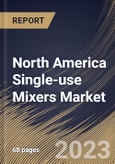To reduce the risk of cross-contamination and guarantee product uniformity, these mixers are designed to eliminate the need for sterilization or cleaning between batches. The growing demand for tailored medications and biologics, which call for small quantities and exact control, has led to a surge in demand in recent years. Additionally, single-use mixers provide several benefits, including lower capital and operating costs, quicker turnaround times, and a smaller environmental effect.
The dissolving of solids and powder, producing excipients, and adding pharmaceutical ingredients for the final formulation are just a few of the operations that call for efficient mixing equipment. Therefore, single-use mixers are the way of the future when it comes to reducing costs, improving procedures, and raising output in the biopharmaceutical business. These are useful for eliminating gaps and delays in the manufacturing process, and pharmaceutical businesses have come to understand their advantages. These provide a short turnaround time, a lean manufacturing process, scheduling flexibility for the factory floor, and a lower start-up cost.
The United States accounts for roughly a third of the biopharmaceutical industry and is the global leader in biopharmaceutical research & development. In 2017, the US biopharmaceutical industry contributed $97 billion to R&D spending, and the sector's overall economic influence on the US economy is sizable. For example, over $17 billion worth of biopharmaceuticals were exported by American businesses with significant foreign ownership in 2018. In the same year, these largely foreign-owned businesses also made roughly $20 billion in R&D investments. As a result, the use and development of single-use mixers have increased due to the region's strong biopharmaceutical and pharmaceutical industries, which have invested much in R&D projects to fulfil the stringent regulatory standards.
The US market dominated the North America Single-use Mixers Market by Country in 2022 and would continue to be a dominant market till 2029; thereby, achieving a market value of $511.7 Million by 2029. The Canada market is showcasing a CAGR of 9% during (2023-2029). Additionally, The Mexico market should witness a CAGR of 8.8% during (2023-2029).
Based on Product, the market is segmented into Consumables & Accessories and Mixing Systems. Based on Application, the market is segmented into Research and Development (R&D) & Process Development and Commercial Manufacturing. Based on End-user, the market is segmented into Pharmaceutical & Biotechnology, CMOs & CROs and Academic & Research Institutes. Based on countries, the market is segmented into U.S., Mexico, Canada, and Rest of North America.
The market research report covers the analysis of key stake holders of the market. Key companies profiled in the report include Sartorius AG, Danaher Corporation (Cytiva), Merck & Co., Inc., Thermo Fisher Scientific, Inc., Meissner Filtration Products, Inc., DrM, Dr. Mueller AG, Avantor, Inc., CerCell A/S (Stobbe Pharma GmbH) (Stobbe Group), Agilitech, and Holloway America.
Scope of the Study
By Product
- Consumables & Accessories
- Mixing Systems
By Application
- Research and Development (R&D) & Process Development
- Commercial Manufacturing
By End-user
- Pharmaceutical & Biotechnology
- CMOs & CROs
- Academic & Research Institutes
By Country
- US
- Canada
- Mexico
- Rest of North America
Key Market Players
List of Companies Profiled in the Report:
- Sartorius AG
- Danaher Corporation (Cytiva)
- Merck & Co., Inc.
- Thermo Fisher Scientific, Inc.
- Meissner Filtration Products, Inc.
- DrM, Dr. Mueller AG
- Avantor, Inc.
- CerCell A/S (Stobbe Pharma GmbH) (Stobbe Group)
- Agilitech
- Holloway America
Unique Offerings
- Exhaustive coverage
- The highest number of Market tables and figures
- Subscription-based model available
- Guaranteed best price
- Assured post sales research support with 10% customization free
Table of Contents
Companies Mentioned
- Sartorius AG
- Danaher Corporation (Cytiva)
- Merck & Co., Inc.
- Thermo Fisher Scientific, Inc.
- Meissner Filtration Products, Inc.
- DrM, Dr. Mueller AG
- Avantor, Inc.
- CerCell A/S (Stobbe Pharma GmbH) (Stobbe Group)
- Agilitech
- Holloway America








